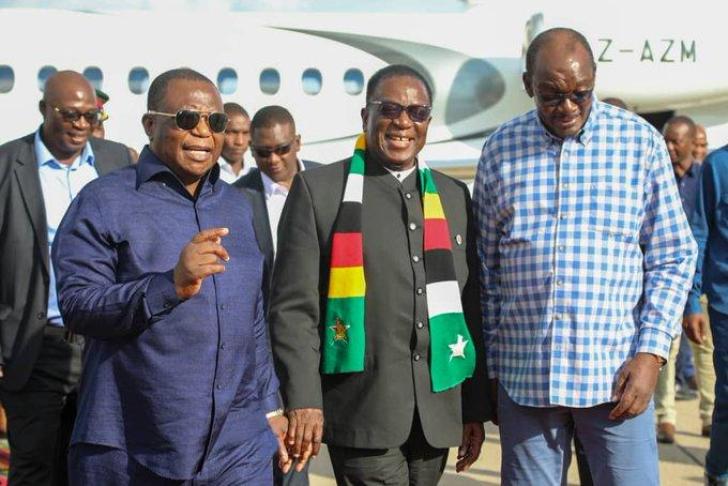News / National
Factionalism threatens Zanu-PF unity
30 Sep 2024 at 06:42hrs |
0 Views

ZANU-PF's ongoing cell restructuring exercise has revealed deep-rooted factionalism within the ruling party, as loyalists aligned with President Emmerson Mnangagwa and his deputy, Constantino Chiwenga, vie for control of key party structures. The internal power struggle has intensified as both camps position themselves for influence ahead of Mnangagwa's expected departure in 2028, when he is set to complete his constitutionally mandated two terms.
Despite Mnangagwa publicly stating on three occasions that he will step down at the end of his second term, some party loyalists under the "ED2030" banner are pushing for a constitutional amendment to allow him to remain in office beyond 2028. This has deepened divisions within ZANU-PF, particularly as the party gears up for its annual people's conference in October, where succession discussions are expected to dominate.
Observers suggest that the reduced number of delegates for this year's conference reflects the intensity of the internal battles, as factions seek to consolidate power in the run-up to 2028.
The cell verification exercise, which began on June 17, saw the deployment of senior party members across Zimbabwe's 10 provinces. However, the process has been marked by chaos and factional infighting, with reports of manipulation in favour of either Mnangagwa or Chiwenga, depending on who controls the local districts.
"Cells were manipulated depending on which faction dominated a district," a source within ZANU-PF's commissariat department revealed. "The ultimate goal is to control districts and provinces, which are crucial in securing a base for any leader eyeing the presidency."
District coordinating committees have also been caught in the crossfire, with party insiders predicting an intensification of factional battles as the 2028 elections draw closer. Branch executive committees were tasked with physically restructuring cells and villages, but the process has been fraught with unrest, as provincial leaders aligned with either Mnangagwa or Chiwenga jockey for influence.
During a politburo meeting last week, Mnangagwa warned party members against actions that threaten the unity of ZANU-PF and the country's stability. "All moves to damage the interests of the people of our great motherland tamper with our unity, social harmony, development interest, sovereignty, security, and overall national stability and should be decisively dealt with," Mnangagwa said, cautioning against forces trying to undermine party cohesion.
ZANU-PF's spokesperson, Christopher Mutsvangwa, declined to comment on the internal divisions, citing his absence from the country. Other key party figures, including the political commissar Munyaradzi Machacha and national secretary for security Lovemore Matuke, were unavailable or referred inquiries to one another.
Machacha previously acknowledged that some defeated candidates were refusing to concede defeat during the cell restructuring exercise, which has contributed to the unrest and power struggles within the party. He said that efforts to reclaim influence by these candidates have fueled tensions during the process.
ZANU-PF has a long history of internal conflicts, with factionalism frequently threatening to disrupt the party's unity. As the succession debate escalates and the battle for control of party structures intensifies, the coming months may prove to be a critical period for ZANU-PF's future.
Despite Mnangagwa publicly stating on three occasions that he will step down at the end of his second term, some party loyalists under the "ED2030" banner are pushing for a constitutional amendment to allow him to remain in office beyond 2028. This has deepened divisions within ZANU-PF, particularly as the party gears up for its annual people's conference in October, where succession discussions are expected to dominate.
Observers suggest that the reduced number of delegates for this year's conference reflects the intensity of the internal battles, as factions seek to consolidate power in the run-up to 2028.
The cell verification exercise, which began on June 17, saw the deployment of senior party members across Zimbabwe's 10 provinces. However, the process has been marked by chaos and factional infighting, with reports of manipulation in favour of either Mnangagwa or Chiwenga, depending on who controls the local districts.
"Cells were manipulated depending on which faction dominated a district," a source within ZANU-PF's commissariat department revealed. "The ultimate goal is to control districts and provinces, which are crucial in securing a base for any leader eyeing the presidency."
During a politburo meeting last week, Mnangagwa warned party members against actions that threaten the unity of ZANU-PF and the country's stability. "All moves to damage the interests of the people of our great motherland tamper with our unity, social harmony, development interest, sovereignty, security, and overall national stability and should be decisively dealt with," Mnangagwa said, cautioning against forces trying to undermine party cohesion.
ZANU-PF's spokesperson, Christopher Mutsvangwa, declined to comment on the internal divisions, citing his absence from the country. Other key party figures, including the political commissar Munyaradzi Machacha and national secretary for security Lovemore Matuke, were unavailable or referred inquiries to one another.
Machacha previously acknowledged that some defeated candidates were refusing to concede defeat during the cell restructuring exercise, which has contributed to the unrest and power struggles within the party. He said that efforts to reclaim influence by these candidates have fueled tensions during the process.
ZANU-PF has a long history of internal conflicts, with factionalism frequently threatening to disrupt the party's unity. As the succession debate escalates and the battle for control of party structures intensifies, the coming months may prove to be a critical period for ZANU-PF's future.
Source - newsday
Join the discussion
Loading comments…
























